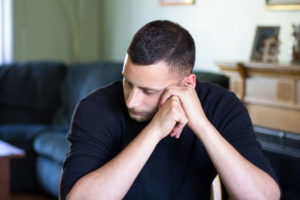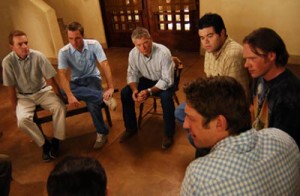COVID-19 As a Traumatic Experience

At the time of this writing in early June, 2021, my local community of Los Angeles/West Hollywood (California) is gearing up for the broader grand re-opening of California by order of Governor Gavin Newsom on June 15th (according to a Los Angeles Times article of May 21, 2021, here).
The new guidelines basically remove masking, distancing, quarantining, capacity, and other restrictions that have been with us worldwide, and more specifically in California, since March, 2020. The easement of these restrictions is welcome news, not only because it lifts a burden from the populace, but also because it’s an indication that a pandemic that has killed 600,000 Americans, and more abroad (3.5 million), is coming to a welcome end for many countries and regions, thanks to the miracle of modern medicine (several vaccines) once again.
Gay men have been here before, as I have said throughout the COVID-19 pandemic (my articles on that previously are here and here), in that we, as a community, especially those of us “of a certain age,” when we fought the HIV/AIDS crisis that very specifically affected gay men (although other groups affected should not be ignored). That is why, in large part, the Republican-led United States government under then-Presidents Reagan and Bush (Sr.) ignored it. It really was only when it started affecting people outside the gay male demographic (which it did all along, really) did the conservative, Republican, viciously anti-gay government get on it to any meaningful degree (such as funding for medical and social programs).
As one (of many) of my Brooklyn Jewish friends says, “Hey, yeah, gay men know from pandemics, all right?” The fears. The mysteries. The frustrations. The confusion. The striving for scientific advances. The bigotry and hysteria. The denialism. The resistance. And, finally, the hope that the very worst of it subsides and the full impact of carnage from the disease declines meaningfully and somewhat suddenly, statistically, once people avail themselves of the right medicines, whether that’s vaccines or HIV treatments.
So, as we “cope with the hope” that the COVID-19 pandemic is subsiding, certainly in California but in many places around the world (with some important exceptions), what are we left to feel? What do we do now?
As many of you who know my writing can predict, my question is always, in response to many topical mainstream news stories, how does all this apply to gay men?
What is a traumatic pandemic like for a population that has already known, in its collective unconscious as well as, for some, its direct memory, a decimating pandemic? What is it like to see it all start, endure it, and see (most of) it end? Again?
Many gay men will rejoice and celebrate the re-opening of life as we knew it in early 2020, and many will pretend like it never happened (as one client said to me recently). However, others will emerge from the pandemic not as they went in, but changed. COVID-19 has not only been a disease; it’s been a collective and social trauma, but with many individual impacts; on the larger society, but also in smaller units like families, circles of friends, couples, and individuals.
Not everyone who lives through a traumatic event (sometimes defined as a life event that threatens death, permanent injury, or serious harm) goes on to exhibit the psychological signs of trauma, or even Post-Traumatic Stress Disorder (PTSD). According to my mentor, the late Michael Shernoff, LCSW, a gay men’s specialist therapist for 30 years in New York, not everyone at Ground Zero in New York on 9/11 (2001) suffered from trauma symptoms afterward, when he did crisis debriefing work on the scene as a volunteer with the American Red Cross when it happened and for some time afterward. However, since then, I’ve worked with several gay male clients who do have PTSD symptoms from being there that day.
Will we see cases of PTSD from COVID-19 in gay men? Possibly. It’s a safe bet. But we also will likely see a spectrum of reactions, from those who “pick up where they left off” in early 2020 to those who will struggle with some form of COVID-19 related trauma for some time to come.
Symptoms of a Trauma Reaction
According to the Mayo Clinic, PTSD symptoms are generally grouped into four types: intrusive memories of the event(s), avoidance of stimuli that reminds one of the event(s), negative changes in thinking and mood (such as decreased practical functioning, or anxiety/depression), and changes in physical and emotional reactions (such as a startle response, hypervigilance, or even a certain paranoia). Symptoms can vary over time (sometimes with a delayed reaction) and vary from person to person.
Let’s look at some of these psychological reactions:
Intrusive memories
Again, according to the Mayo Clinic, symptoms of intrusive memories may include:
- Recurrent, unwanted, distressing memories of the traumatic event(s)
- Reliving the traumatic event as if it were happening again (“flashbacks”)
- Upsetting dreams or nightmares about the traumatic event
- Severe emotional distress or physical reactions to something that reminds you of the traumatic event
In my long (29 years) career as a specialist therapist (and coach) for gay men, I’ve seen guys with all of these, from surviving the AIDS epidemic, to car crashes, to natural disasters, to being victims of violent crime, to job loss, to workplace bullying (one of my particular clinical interests), discrimination, childhood emotional/physical/sexual abuse, sexual assault, domestic violence, life-threatening illness, financial ruin, government oppression, and more. It is reasonable that all of the collected events and conditions we endured through COVID-19 could cause trauma responses as well.
Avoidance
Symptoms of avoidance may include:
- Trying to avoid thinking or talking about the traumatic event (such as the client who wants to “pretend it all never happened)” as a psychological defense to taking in the pandemic’s full emotional, social, financial, and physical impact)
- Avoiding places, activities or people that remind you of the traumatic event (such as probably an aversion to masks, all face coverings, being alone/isolated, even being “stuck” at home).
Negative changes in thinking and mood
Symptoms of negative changes in thinking and mood may include:
- Negative thoughts about yourself, the world around you, or your future (what Aaron Beck, MD, the “father of cognitive therapy”, called the Negative Cognitive Triad, which is a precursor to Major Depressive Disorder)

- Hopelessness about the future; lack of motivation; lack of dreams/goals, lack of having a sense that there is a future for you
- Memory problems, including not remembering important aspects of the traumatic event, which have been “blocked out” by your unconscious mind as a psychological defense against remembering the full emotional impact of the event(s)
- Difficulty maintaining close relationships (especially after all this isolation)
- Feeling detached from family and friends (such as not re-engaging with people, even after the lockdown, when we “can” safely congregate again)
- Lack of interest in activities you once enjoyed (such as not doing things you used to enjoy before the pandemic, even though they are once again available to you)
- Difficulty experiencing positive emotions (such as not “trusting” having a good time, or not “trusting” being out in public again, because on some level you fear another pandemic, another lockdown, another isolation)
- Feeling emotionally numb (having to numb ourselves so much during the pandemic just to “get by” that we have trouble re-starting our emotional inner selves again)
Changes in physical and emotional reactions
Symptoms of changes in physical and emotional reactions (also called arousal symptoms) may include:
- Being easily startled or frightened (such as when you hear a loud noise, or someone behind you taps you on the shoulder, or when you encounter an anxiety-provoking situation, such as crowds, long lines, or any loud noises)
- Always being on guard for danger (feeling like you have your “guard up” at all times)
- Self-destructive behavior, such as drinking too much or driving too fast (especially with a certain “who cares, we’re all gonna die anyway” attitude)
- Trouble sleeping (including not knowing why)
- Trouble concentrating (such as getting your head “back in the game” at work after your office reopens)
- Irritability, angry outbursts or aggressive behavior (especially when you find yourself reacting this way with relatively little provocation, when you surprise yourself at your own reaction, and others around you; “not being your old self”)
- Overwhelming guilt or shame (such as “survivors guilt” that you survived the pandemic at all, or that you did so with less overall hardship than others you know)
If you recognize any of these phenomena in you, try not to feel ashamed or guilty; these are actually quite common reactions to traumatic events (perhaps with varying presence, severity, intensity, and duration). Try to realize that naming these feelings as trauma reactions can help you feel validated, less alone, and with more insight into what’s going on with you.
Phases of Healing from a Traumatic Event
But rather than feeling like you’re stuck forever with these traumatic symptoms, the next step is to think about how people can, and do, recover from them and get better.
The widely-accepted phases for healing are generally thought to be these three:
1. Safety and Stabilization – In this phase, “we” (often meaning your therapist and you) have to focus on your achieving or restoring your basic safety and stabilization in life. For COVID, are you vaccinated? Are you informed about the local restrictions, and how they change over time? Are you aware of when your reactions and symptoms are strongest and weakest? Do you have a sense of how your symptoms affect your work, friends, daily at-home life, sex life, relationships, and family life? Is there anything you need to do in practical terms that would make you feel more safe, emotionally, overall? Are you stable in your ability to do your job and take care of yourself at home? Can you socialize?
According to TraumaRecovery.ca, this “safety and stabilization” phase can have other meanings, too:

People affected by trauma can endure a pervasive sense of not feeling themselves or just not feeling safe/comfortable, sometimes without being able to really articulate why. There can be an anxiety or wariness about other people and situations, and maybe a sense of isolation. Even if public health officials in your area announce that it’s “OK” and reasonably safe to go to gay bars, clubs, beaches, resorts, cruises, or even sex clubs, bath houses, or back rooms, you might not feel safe doing this, even if it was something you used to do before as a matter of routine.
When I work with clients, I always say the number-one most important word in trauma recovery is “reclaiming” – asserting your right to reclaim for your own what you used to be able to do, think, feel, and allow, before the perpetrator (either a person or a phenomenon, like COVID) victimized you. It’s saying to the trauma, “Oh, no, buddy-boy, you aren’t going to take away the things that I enjoy from my life and make me live in fear.” As the song by Diane Warren says, that Cher sang in “Burlesque”.
“I’ve been brought down to my knees.
I’ve been pushed, right to the point of breaking
But I can take it.
I’ll be back, back on feet.
I am far from over; you haven’t seen the last of me.” — (Diane Warren, “You Haven’t Seen the Last of Me”)
Recovering from trauma and regaining a sense of safety may take days, weeks, months, or maybe years to fully integrate what the past year and a half have meant for the world in general and gay men in particular, more specifically you.
Therapy teaches clients something called “affect regulation,” which is basically a fancy clinical term for pulling yourself together, being able to “regulate” the feelings that come up in everyday life, which may not “appear” at first glance to be related to the trauma.
But talking about what you’ve been through can be tough. Therapy sessions or functional coaching can feel like hard work, and you might kind of hate your therapist or coach for “making me do this every week.” But yet it’s like Leg Day at the gym; painful, but worth it if you want the reward that’s on the other side of doing the work.
It helps to take it somewhat slowly, so that you don’t overwhelm yourself with too much emotion, thought, and feeling at the same time. Various techniques such as Mindful Meditation can help, and there are many “evidence-based practice” theories (techniques that have been shown via formal research to be effective in symptom reduction or functional improvement) that a therapist can draw from to help you. Self-care is key, just like recovering from a physical injury or surgery might be.
There are also considerations for “adaptive” versus “maladaptive” coping strategies. Adapting coping might be practicing self-care, using supportive people to talk to from your family or circle of friends, and of course therapy. Maladaptive coping might be drinking or using too much, avoiding attempts to actively heal by just living in denial, or isolating yourself trying to hide from the world ever after.
Taking care of yourself can also mean using certain good habits, such as paying attention to your nutrition, exercise, stress management, and interpersonal relationships. Since COVID was so pervasive across the world, at least our misery “loves company”. For some, including gay men, we might need to strategically use medication from a psychiatrist to get us through the early re-integration, such as a prescription antidepressant, sleep aid, or anxiolytic. For others, re-emergence from COVID will be a gradual re-integration into the things that became suddenly banned for us (like going to a local bar) but are now accessible again. Hopefully, local public health officials everywhere will guide what commercial establishments can and cannot do in terms of long-term COVID safety, which might change from time to time, and be applied to all sub-populations, such as gay men, even though conditions will likely vary among towns, cities, states, provinces, countries, and cultures over months of time.
2. Remembrance and Mourning – In this phase, you have the opportunity (through therapy, coaching, or both) to talk about what the traumatic event(s) have meant for you, and have the opportunity to consciously mourn whatever you lost, whether in real terms or “just” in the loss of a sense of safety in your own subjective world. Without judgment or expectation, we explore just “how it is” for you. You recall the beginning, middle, and end of the event(s) that affected you, so that your brain literally “processes” the memories between the two hemispheres of your brain, called “horizontal integration” (I taught about this stuff in a course on “Evidence-Based Psychotherapy Practice” at USC). We also discuss the mind/body connection. Your defenses that were triggered in response to the traumatic event threat get “made sense of” by the horizontal integration of your brain, and the “vertical integration” of the mind/body connection (headaches, stomachaches, backaches, twitching eyelids, back pain, muscle tension, diarrhea, rashes, and insomnia can all be physical reactions of trauma in the body). The father of psychotherapy, Sigmund Freud, MD, called therapy “the talking cure” in the early 20th century just for this reason, that talking about your experiences (such as traumatic ones) lessens the negative emotional and physical impact the events have on you.
3. Reconnection and Integration – This is probably my favorite phase, because over and over, I get to see my clients “get their old selves back” and re-integrate into being at their best at work, in their social life, in their relationships, sex, and sense of self. You might not ever be exactly the same after a traumatic event as you were before, but that’s also called growth in life. You re-connect to the people, activities, thoughts, feelings, and actions that were lost as a result of the trauma. There’s a showtune for this, from “Hello, Dolly” called “Before the Parade Passes By” (“I’m going to get some life back into my life’) (Jerry Herman), that I encourage clients to listen to (in the story, Dolly “comes back to life” after a period of mourning her late husband). You might not re-integrate into the world in the exact same way as you left – maybe you’re a little wearier, a little wiser, a little warier – but also with a renewed perspective of how the world is, both good and bad. Gay men were not really the same, collectively, after the AIDS crisis. We had perspective. We actually learned to fight harder, to literally fight for our lives. We will be the same with COVID; we will appreciate being with others in whole new ways, because we have learned what it’s like to be without them. We will appreciate just being outside to literally breathe free, because now we know what it’s like not to.
According to TraumaRecovery.ca, the phase of Reconnection and Integration can include the idea that we create a new sense of self and a new future, emotionally informed by what we’ve been through. Maybe our perspective, priorities, or values change a bit. Maybe our philosophies change a bit. For myself, I find myself a little less idealistic about human nature, after seeing such a large magnitude of selfishness from people (usually Republicans/Trump supporters) who resisted, often violently, government orders like mask-wearing on airplanes. But I’ve also found an even deeper appreciation for interpersonal relationships with family and friends, since we haven’t been able to see each other in person (“absence makes the heart grow fonder,” as the saying goes). In some ways, we redefine who we are after a trauma. The traumatic experience becomes integrated into our life story, but it is not that trauma that defines us.
We also realize that we have been affected by the traumatic experience, and come to terms with how we were victimized – perhaps not by an interpersonal crime, such as violent robbery, but victimized by Mother Nature, who unleashed a deadly biological pandemic on our world, possibly due to human error but probably by natural causes. We take concrete steps towards self-empowerment (my favorite word in therapy, and the title of my book!). Perhaps we live more mindfully, more purposefully, and with a renewed commitment to what our core values are.
 For some people, their experience of trauma inspires them to enact a mission to heal and grow by helping others, perhaps those who have experienced similar events, by creating peer support. This has been done by cancer survivors, violent crime survivors, and others who want to use their experience either to give emotional support to their peers, or to effect change via government or social policy so that others might be spared a similar experience.
For some people, their experience of trauma inspires them to enact a mission to heal and grow by helping others, perhaps those who have experienced similar events, by creating peer support. This has been done by cancer survivors, violent crime survivors, and others who want to use their experience either to give emotional support to their peers, or to effect change via government or social policy so that others might be spared a similar experience.
Everyone has their own, individual response to trauma, and with something as broad as COVID-19, it’s going to mean, in the long term, different things for different people, long after it is essentially “over” in practical terms, not only for individuals, but also for whole groups, such as gay men. How will our collective gay community be affected, say, five years from this? I’m hoping that it brings gay men closer, perhaps with less “attitude” at bars and clubs and more of a sense of fraternity and brotherhood, although I realize this might be idealistic in our admittedly competitive subculture. While future generations won’t really know about COVID-19 in the same way as us, who are living through it now (similar to the AIDS crisis), those of us who are/were alive during the COVID crisis will always know, first-hand, what it was like, and we will feel a certain, “eh; you had to be there” feeling. Our gay generation (from teens to seniors) will share that bond, just as we did during the height of AIDS. I’m sure the Stonewall Generation (before my time, thank you very much) felt the same way.
Making Meaning of Traumatic Experiences in Context
The last phase of trauma recovery is about “making meaning,” and somehow, existentially, putting what we’ve been through in the context of our own personal biography, part of the life story we create throughout our life span. We put what we’ve just been through in the context of everything we’ve ever known, about our own personal development, our Family of Origin, our Family of Choice, our personal life experiences (both personal and professional), and in the context of the history of our life spans.
Traumatic experiences are not fun, or romantic, or exciting. But they can be meaningful. We know we have good times in our lives by also knowing what it’s like to have bad times. We understand who we are in our world, what’s important and what’s not, who are friends are (and who they are not), and our place in history by experiencing many things, good, bad, and in-between, across (hopefully) many years in one lifetime. One of the many reasons I love my older friends and love hearing from their experiences is how they “got out of a jam” in ways that I can use if I ever find myself in similar situations. They are, literally, wise. I learn from older friends what’s really important in the long run, and that helps me keep perspective, set priorities, and really focus, when there is always limited time, money, and energy to deal with life’s bullshit. And, I learn from my younger friends constant reminders of how to be spontaneous, social, sexual, optimistic, energetic, and cultural (especially with new music and movies).
Every lifetime, if we live long at all, has its share of moments that are amazing and make you feel lucky to be alive, especially in that time and place. And, every lifetime has aspects that truly suck. I wonder what the people who lived through the 1918 flu pandemic would say about COVID-19 today. My guess is that they would say we should be grateful that medical technology is much better today. And, I think they would say that no matter how bad it was then, or now, life moves in one direction, forward, and what we have to come to terms with what we have endured and simply ask, What next?
Traumatic experiences like COVID do help us to cultivate personal (and some collective) psychological resilience. I’ve written on resilience in gay men pretty extensively before, so I’ll let you find those links, if you’re interested, here and here [Elements of Resilience (my two-part article on that is here and here. That is a two-part article on what resilience in gay men is, and how you apply those techniques. Resilience is one, if not the best for coping with trauma or even less-than-traumatic stress.
Daring to Hope, Daring to Live
On the occasions that I’ve talked with either clients or friends about surviving and thriving after a traumatic event, one theme I hear often is that at some point in time in your recovery, you have to dare to hope, and dare to live again. Resilience and triumph are the ability to experience a trauma, and yet live to tell the tale (think about survivors of the Titanic sinking, and how they were interviewed for years after, or the bombing of Pearl Harbor at the start of World War II, or survivors of the concentration cramps during the Holocaust). One theme that runs through them is the idea that they did survive, even if many others tragically did not. They went on to have relatively “normal” lives that put the historical event they survived in a certain long-term context. For some, that historical event was not necessarily the most momentous event of their lives. Maybe their wedding was. Or the birth of their children. Or running a business. Or having a career. Or having a special hobby, or civic achievement. They dared to survive and go on to do great things, and they didn’t let the traumatic event they survived stop them from doing those things. Perhaps they had the confidence to do those things in the up side of life because they knew very well what can happen in the down side of life, and they weren’t going to let traumatic events have the last word.
Like bears or other animals coming out of winter hibernation, gay men, too, will “come out,” yet again, from the “imposed safety” of some isolated place and be out in the light again. We will “tip toe” out of our comfort zones and explore who we are as men, as part of the LGBT community, and as part of the world. Hopefully, we won’t be “damaged” by the experience as much as we are “informed” by it, even perhaps “enlightened” with a renewed perspective of what it means to be healthy, what it means to be with others, what it means to be a part of the larger society, and certainly what it means to be a community.
And then we all get to say, as Cher did, “You haven’t seen the last me.” And if Cher says it, it’s good enough for me.
If you need support for recovering from COVID-19, or any traumatic experience, consider therapy or coaching services from GayTherapyLA.com. We are here to help, whether in person in Southern California (Los Angeles/West Hollywood), or via webcam, to guys all over the world. With over 29 years experience as a gay men’s specialist, an AASECT-Certified Sex Therapist, a ranked academic in Social Work at USC, and as an author/activist, I offer a perspective that straight therapists, or even new gay male therapists who aren’t long-term specialists, can’t. For more information on booking a consultation appointment, call/text 310-339-5778, or email Ken@GayTherapyLA.com.



